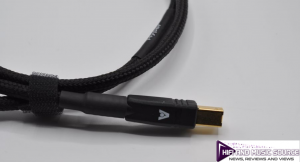This is an objective look at the Atlas Hyper USB cable which is often the digital link between one of the noisiest electrical sources (a laptop) and the other that needs to be electrically silent, often a DAC. Really this cable is facilitating the transfer of data packets (1s and 0s by all accounts) by a bunch of very excited electrons between two points. Timing is key, ideally, the excited electrons need to be free of interference, which is where the materials science geeks get excited as they seek to balance conductors, dielectrics and connectors, whilst the management calculates the cost.
Design
 Specifically, I am looking at the new(ish) Atlas Hyper USB cable, though I do have a Mavros USB with GRUN from a previous review and Atlas has also sent me the Element USB cable for comparison.
Specifically, I am looking at the new(ish) Atlas Hyper USB cable, though I do have a Mavros USB with GRUN from a previous review and Atlas has also sent me the Element USB cable for comparison.
The Atlas Hyper USB cable has a solid OCC (Ohno Continuous Casting, which is a process) copper core for carrying the data that Atlas claims minimises attenuation, energy dissipation, and low conductivity issues. The outcome of this is that this leads to more consistent performance. There is a separate path for the power handling in this Atlas Hyper USB cable (USB cables carry power as well as data) that seeks to minimise the noise and interference between it and the data signal. The dielectric (insulating material) used with the Hyper is PEF (a gas foamed polyethylene). There is a triple shield around the cable core that is finished nicely with a black braided cloth style material. The braided material has the same feel as the Mavros USB cable or the Zeno cable upgrades.
The Element USB cable uses a different casting process, but it still uses an OFC (Oxygen Free Copper) solid core with different insulators.
Quality
In all, there is a reassuring quality to the braided cable finish that makes it very difficult to bend adversely, which is what we want on our desktop. Once out of the box the Atlas Hyper USB cable drops its coiling fairly promptly, offering a straight run between sources.
The Atlas Hyper USB cable is priced near £215 inc. VAT for 2 meters, the Element is £61.50 for the same 2 meters.
Performance
Review Equipment
Cable reviewing is a tough job, I find the best way to do it is to pick only a few tracks that you are familiar with, and you know are well produced and just commit to it. Fortunately, at this time I have some stunning equipment to try and evaluate USB data cables.
I am using the Atlas Mavros USB A-B with GRUN (the Atlas earthing system) as my admittedly high-end reference point between a Dell XPS laptop and a T+A HA 200. The HA is powered with a Vertere Redline power cable which is here for a future project as it happens, but we are here to talk about Atlas. Headphones are the Meze Elite that has just been awarded an Outstanding badge here at HF&MS. I have actually upgraded the cable in the Elite to an Atlas Zeno Harmonic XLR with GRUN which suits the HA200 nicely, and me too.
After this, it was a question of swapping the Hyper and Element after powering off the T+A headphone amplifier. I am just using the Qobuz Desktop App.
I have run the USB cables twice overnight individually, but they would almost certainly improve over time. Atlas prefer 72 hours of burn-in. I have got their burn-in disc on my server, which helps, though my laptop is sweating a fair bit.
My playlist Qobuz playlist is here, Lana Del Rey (Qobuz 24-bit, 48kHz) and the amazing Arooj Aftab (Qobuz 24-bit, 96kHz) for crystal clear female vocals, Bobby Gillespie for Male Vocals, Fleet Foxes’ Helplessness Blues (Qobuz 24-bit, 96kHz) for guitar layers, harmonies and openness and Led Zeppelin III (Qobuz 24-bit, 96kHz) for cymbals and scale (and banjo!).
Physically
On my desktop the Hyper and Element USBs are the perfect length at a meter long, the Hyper had dropped its coil but the Element still retains a bow in its cable run.
Vulture Prince (Qobuz 24-bit, 96kHz)

If I start with the best sound and work down in price terms, that feels like a sure way of identifying changes. Instantly, at the beginning of the track Last Night, the gut of the double bass is deeply felt, the rattle of the snare is clearly presented, and the detail is real.
At 2’14” in the track there is a shift in tone with a heavy bassline added to support the Arooj Aftab’s beautiful vocal. With the Mavros USB, this tone change is seamless and heavily heartfelt and it grabs your attention. There is a change with the Hyper USB though it is still has a lovely sound at this tonal shift in the track. The previous snares are quite clearly rattling around in the background as desired. The presentation with the Atlas Hyper USB cable is a very natural one.
I am finding the Element USB carries less clarity in the snare vibration stakes at the beginning of this track, but this is fairly marginal and only discernible because I have such a high-value listening system as I have described, the vocal is still lovely though.
Chemtrails Over the Country Club (Qobuz 24-bit, 48kHz)
Certainly, one of my favourite vocal performances of last year, Lana Del Rey’s voice is so soft and ethereal in this album (and the follow-up, Blue Bannisters). The title track is fantastically open, poetic and delicate. The piano is doleful and the cymbals at the end of the track in the right ear linger perfectly as cymbals do. With the Hyper USB, the presentation is once again a more ‘natural’ fit for this listener with the Meze Elite headphones. Again, the Element has a good presentation, but it has a degree of increased brightness that seems to attract undue attention from me, I guess because it is so obvious.
 Speaking of vocal performances, Bobby Gillespie’s (formerly of Primal Scream & Jesus and Mary Chain) album last year with Jehnny Beth (The Savages) called Utopian Ashes is a beauty and it is really nicely produced so offers great clarity. Here too, with much swapping around, the Hyper USB cable is a fine performer with what I now consider to be a more natural presentation.
Speaking of vocal performances, Bobby Gillespie’s (formerly of Primal Scream & Jesus and Mary Chain) album last year with Jehnny Beth (The Savages) called Utopian Ashes is a beauty and it is really nicely produced so offers great clarity. Here too, with much swapping around, the Hyper USB cable is a fine performer with what I now consider to be a more natural presentation.
I did mention in my Meze Elite review recently (Jan 2022) that the presentation of the Fleet Foxes track Helplessness Blues (Qobuz 24-bit, 96kHz) was as good as I can imagine it (I was using a Bluesound Node streaming transport to the T+A HA 200 there, here, of course, I’m using the laptop as the streaming source). With this track, the value of a decent production comes to the fore where you can pick out the individual guitars and vocal harmonies in the track. I would simply add the Atlas Hyper USB cable is doing a fine job of keeping up with the more expensive Mavros USB cable.
My Thoughts
I do understand that cables are very divisive, and this review is an attempt to try to objectively comment on what many consider to be subjective. But what is clear here is the Atlas Hyper USB cable offers a very natural sounding run compared to the Element cable, and it is not a million miles away from the big brother Mavros which has GRUN. It is of course not all about 24-bit Qobuz recordings and as such everything has its level. For me, if I’m spending a great deal on a headphone amplifier, it does feel as if an investment in the cables is commensurate with a high-level solution. I note that there is a USB B mini Hyper option that would offer a more than reasonable Chord Hugo 2 upgrade and that is where I would definitely consider the Atlas Hyper USB cable. I would like to have tried this too, indeed I’ll make an enquiry.
Over these couple of weeks, I have settled on the Hyper USB as the preferred cable, simply because it is the right length, it is doing a fine job and it has disappeared into my desktop set up perfectly. Price-wise, it feels like the Hyper USB is a quality upgrade solution if you are spending six and half thousand on the T+A HA 200, I would say the same for a Chord Hugo 2, an Auralic Vega G2.1 or any other topline USB B DAC.
Overall
Indeed, if you have a high spec DAC… this feels like an upgrade no brainer
The Atlas Hyper USB cable is clearly a very good cable at a ‘let’s invest in my system’ price. As a laptop interface choice, you get what you pay for, and this seems to me to be a pretty good upgrade on the standard-issue you get in most boxes. Indeed, if you have a high spec DAC, as I indicated above, this feels like an upgrade no brainer. The Atlas Hyper USB cable has a more natural presentation in this set-up and is hot on the heels of the premium Mavros USB, where they both share an OCC copper core construction.
All round performance
Right balance of price and performance
Braided finish
No kinks
Just need to hang on to these Meze Elite headphones
And the T+A HA200
Specification
Full details are on the company’s site here
Where to Buy
Atlas Hyper SC USB Type A to Type B Cable is available at Future Shop* here
*This is a sponsored link






